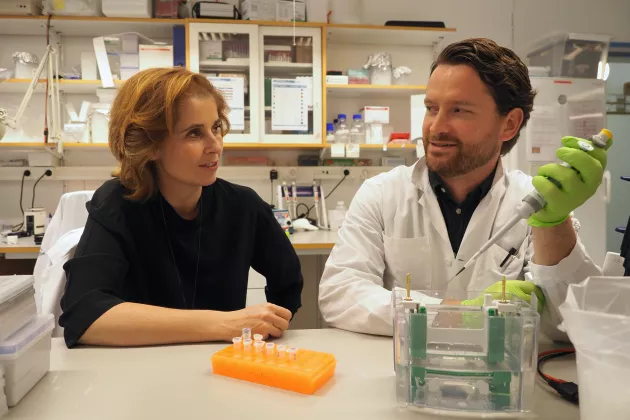“I was very surprised and feel very honored to receive the award. In my role, I do a lot of experimental research, which involves a lot of trial and error. Running experiments can be difficult, so it’s very encouraging that our research is being recognised in this way," says Ben King, associate professor of inflammation research at Lund University Diabetes Centre.
Ben King has an educational background from the United Kingdom, where he completed his doctoral studies within cancer immunotherapy. He has been active as a researcher at Lund University for several years and is one of the researchers in Anna Blom's research group. The group studies the so-called complement system, which is an important part of the immune system.
Protein that protects beta cells
The complement system consists of a large number of proteins that play an active role in the defense against infections, and the group is studying what other functions these proteins have for different diseases. In recent years, Ben King has been focusing on two proteins which seem to play an important role in diabetes.
“With a background in immunology, I have an interest in understanding the function of proteins in the complement system for different types of diseases. Many diabetes research groups are located near our lab, and I soon wanted to find out more about the function of these proteins in the context of diabetes," says Ben King.
He receives the Medeon Award for his innovative research on the two proteins C3 and CD59, which can pave the way for new treatment strategies in diabetes. The protein C3 is secreted from cells and is found in large quantities in the blood, where it plays a crucial role for the body's immune system. Ben King and his research colleagues have shown that C3 is also present inside cells where it has another function. A study, which was published in the scientific journal PNAS, showed that the protein protects insulin-producing beta cells from damage and death when it is present inside the cells.
Important for well-functioning beta cells
The protein CD59 sits on the cell surfaces and protects our cells from damage that may be caused by the immune system inflammation. Ben King and his colleagues have showed that this protein seems to have another function when it is inside the insulin-producing beta cells, where it protects the cells' ability to secrete insulin.
The research on C3 and CD59 was carried out on insulin-producing cells from animals and humans. In the future, the knowledge about these proteins may be important for researchers who want to develop cell therapies for people with type 1 diabetes and type 2 diabetes.
“A goal for many diabetes researchers is to develop insulin-producing beta cells that can be transplanted into patients with diabetes. The knowledge about C3 and CD59 may be important for such research, as it is important that the cells that are transplanted into patients are functioning well," says Ben King.
Ben King receives the Medeon Award in connection with the World Diabetes Day Skåne event, which is arranged at Clinical Research Centre (CRC) in Malmö on November 13.



